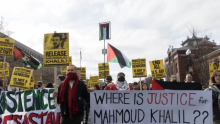
His arrest is a “five-alarm fire” for free speech, experts say, and possibly part of a broader campaign within the Trump administration to stamp out speech the government doesn’t agree with.
That’s because Columbia University protester Mahmoud Khalil was arrested over the weekend potentially for no other reason than that he supported Palestinian causes. Here’s what’s happening and why his case could be a big deal for free speech in America under President Donald Trump.
Khalil is a pro-Palestinian activist at Columbia University
He was a spokesman for last year’s controversial pro-Palestinian protests at Columbia University, which made him a prominent figure in the news. He is a green-card holder, which means he is a legal permanent U.S. resident, and he is married to an American citizen.
Khalil was arrested Saturday by the Trump administration, when immigration officials took him from his apartment in front of his wife, who is eight months pregnant. The officials said his arrest was “in support of President Trump’s executive orders prohibiting anti-Semitism.” He has been detained since.
Officials plan to deport him, but a federal judge has put that on pause while Khalil’s case is debated in court.
Why Khalil’s arrest might be unconstitutional
Officials have yet to say what law he may have broken. Unless there’s new information demonstrating a cause for Khalil’s arrest, experts say this looks like he was arrested for participating in a protest that the Trump administration doesn’t like — and that would be a violation of the First Amendment, which protects free speech, no matter how ugly.
“Mahmoud Khalil’s arrest is part of an across-the-board campaign to suppress dissent across the administration,” said Rachel Goodman, a First Amendment expert with the pro-democracy group Protect Democracy. “It’s a five-alarm fire for free speech, and this is part of the ongoing campaign to demonize immigrants.”
“It sure looks like punishment based on his speech,” said Alex Nowrasteh, an immigration analyst with the libertarian-leaning Cato Institute. “If he is just being targeted for his words and noncriminal actions, it is a gross violation of his rights. If the government has evidence of Khalil’s actual material support for a foreign terrorist organization, they should share that ASAP.”
Goodman and Nowrasteh both reiterated that new information could change the perception of this entirely. But nearly a week into Khalil’s arrest, Trump administration officials have struggled to say what he did wrong other than express pro-Palestinian views.
“I think you can see it on TV, right?” Troy Edgar, the deputy secretary of the Department of Homeland Security, told NPR. “We’ve invited and allowed the student to come into the country, and he’s put himself in the middle of the process of basically pro-Palestinian activity. And at this point, like I said, the secretary of state can review his visa process at any point and revoke it.”
Conservative media personality Ann Coulter said on social media of Khalil: “There’s almost no one I don’t want to deport, but, unless they’ve committed a crime, isn’t this a violation of the first amendment?”
What to know about his legal status
What Edgar said is actually wrong. Khalil is a green-card holder, which means he is a legal permanent U.S. resident who can live and work indefinitely here, and even eventually become a citizen.
That’s different from a visa holder, who only has temporary authorization to be in the United States for a limited time and specific purpose, Nowrasteh explained. It’s not clear if the government can deport a green-card holder simply for speech, reports The Washington Post’s Sarah Ellison.
“The First Amendment protects the right of citizens and noncitizens alike to criticize government policies and positions,” she reports. “It is regularly invoked to protect racist and other hate speech. As long as Khalil is in the United States, he is protected by it, like others on American soil.”
Why this matters to the rest of America
Free speech is the foundation of freedom. And it’s fairly easy to erode once you start to go down that road, experts say.
“If the Constitution doesn’t constrain the government from engaging in an action like this,” Goodman, with Protect Democracy, explained, “it probably doesn’t constrain the government from deporting people who espouse pro-Ukraine views or pro-Canada views.”
Even if Khalil is set free, experts really worry about the chilling effect his arrest will have on anyone in America in a vulnerable position. Trump said on social media that Khalil’s arrest “is the first arrest of many to come.”
Goodman said the administration is actively trying to erode the free speech of many groups it deems political opposition, from its anti-diversity efforts to its takeover of which reporters get proximity to the president at the White House and attacks on the Associated Press, to its penalties on a law firm that has represented Trump’s opponents — a move a federal judge said “sends little chills down my spine.”
by Amber Phillips, 3/13/25
